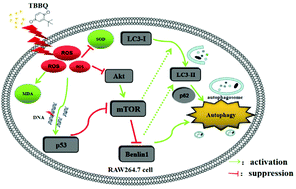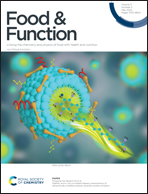tert-Butyl-p-benzoquinone induces autophagy by inhibiting the Akt/mTOR signaling pathway in RAW 264.7 cells
Abstract
tert-Butyl-p-benzoquinone (TBBQ), a metabolite of tert-butylhydroquinone from food, has cytotoxicity, the underlying mechanism of which is not clear. In this study, the viability of RAW 264.7 cells exposed to TBBQ at concentrations of 0.5–10 μg mL−1 was assayed by MTT. Results suggest that TBBQ decreased the viability in a dose-dependent manner. Monodansylcadaverine (MDC) staining results indicate the occurrence of autophagy induced by TBBQ, which was manifested by activation of LC3-II concurrent with the increased levels of Beclin1 and reduced levels of p62. Elevated lipid peroxide and decreased SOD activity by TBBQ exposure suggest the overproduction of ROS, which may account for the increase in the genotoxic stress protein p53. Both upregulation of p53 and reduction of Akt levels inhibited mTOR, which activated autophagy. Addition of 3-MA counteracted the impact of TBBQ on ATG proteins and cell viability. All of these results suggest that TBBQ induces autophagy of RAW 264.7 cells principally by inhibition of the Akt/mTOR signaling pathway, and they implicate ROS in this regulation.



 Please wait while we load your content...
Please wait while we load your content...